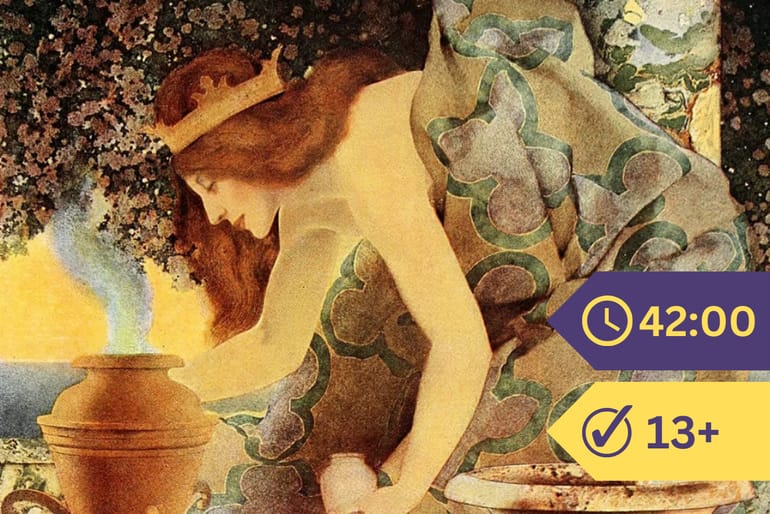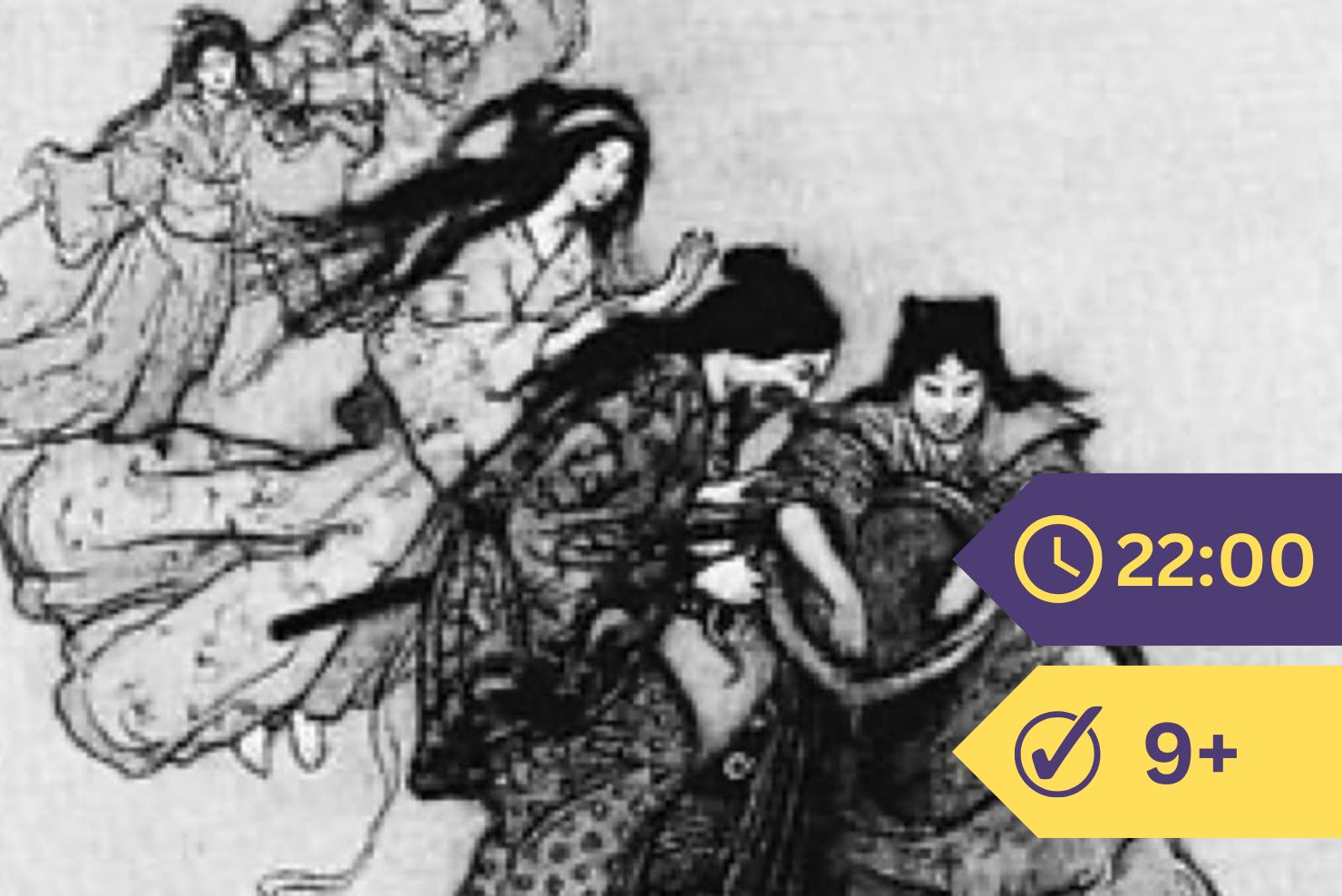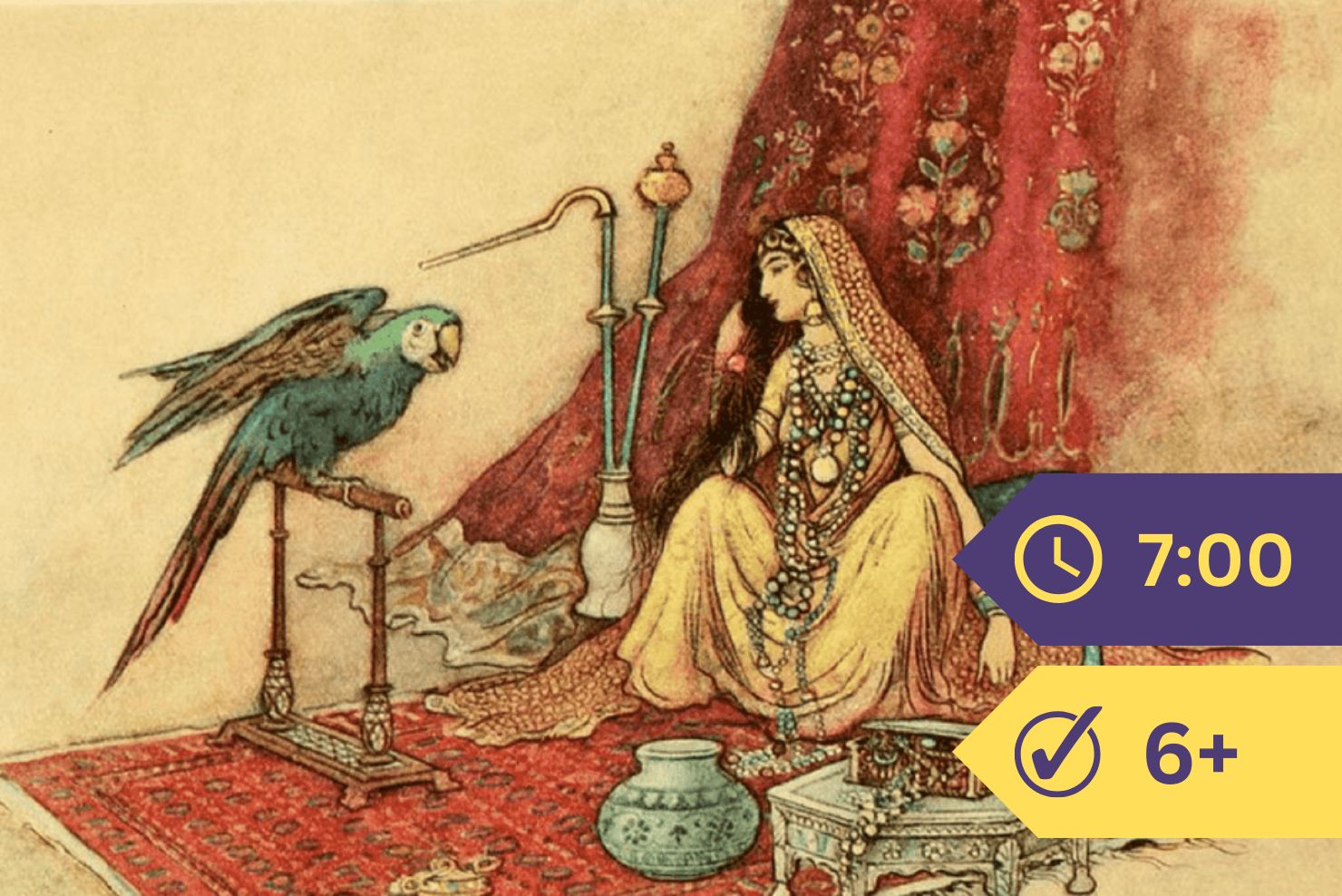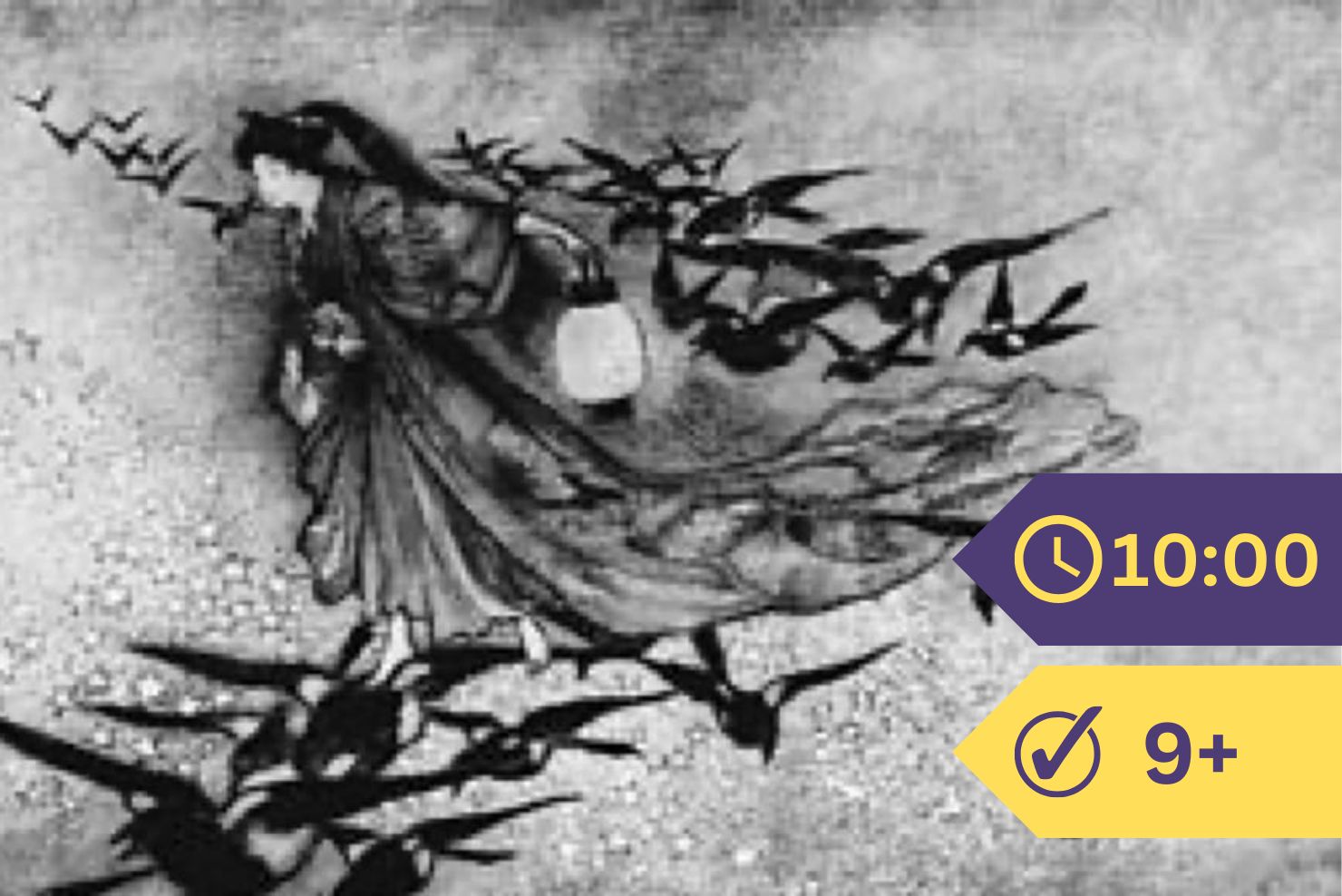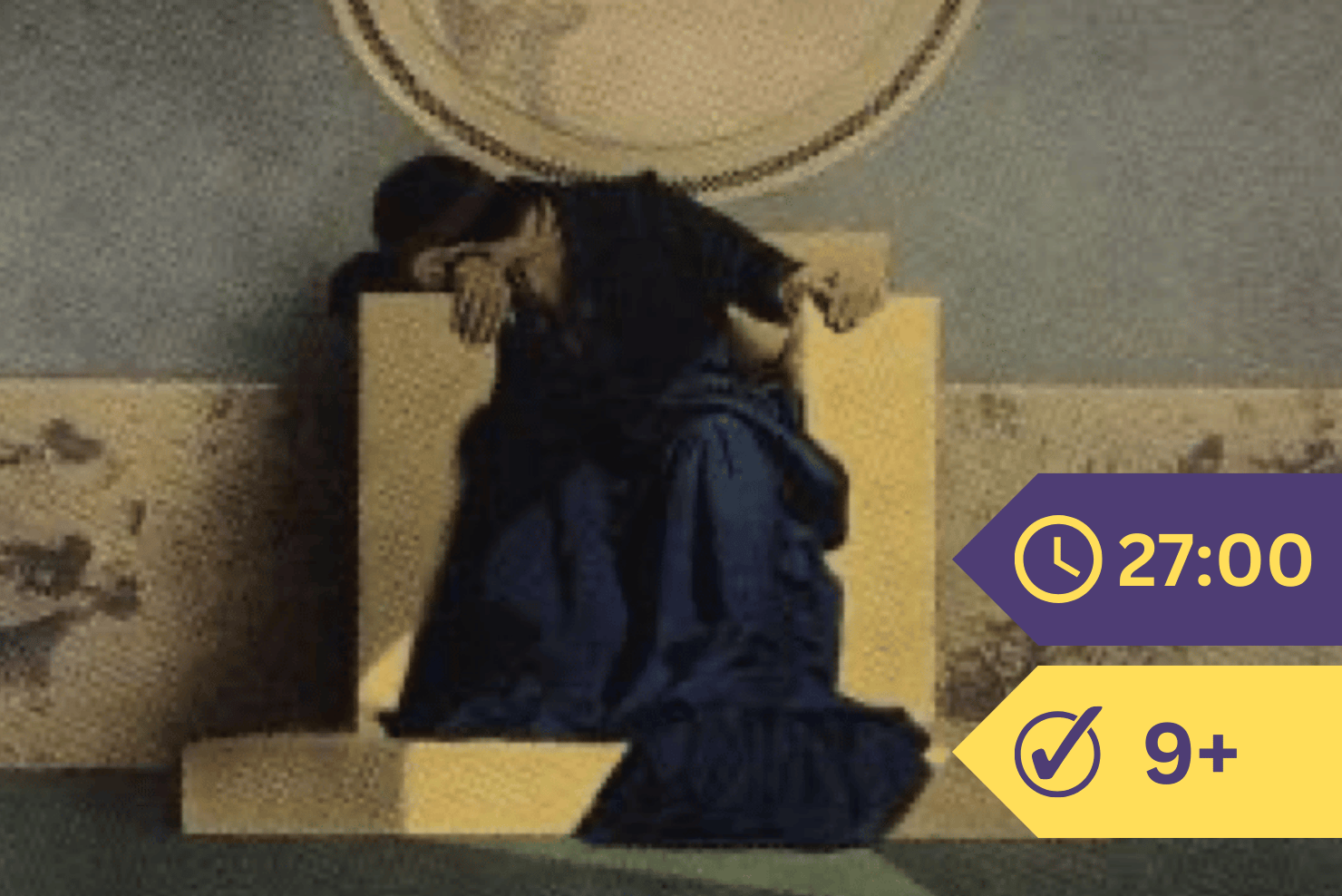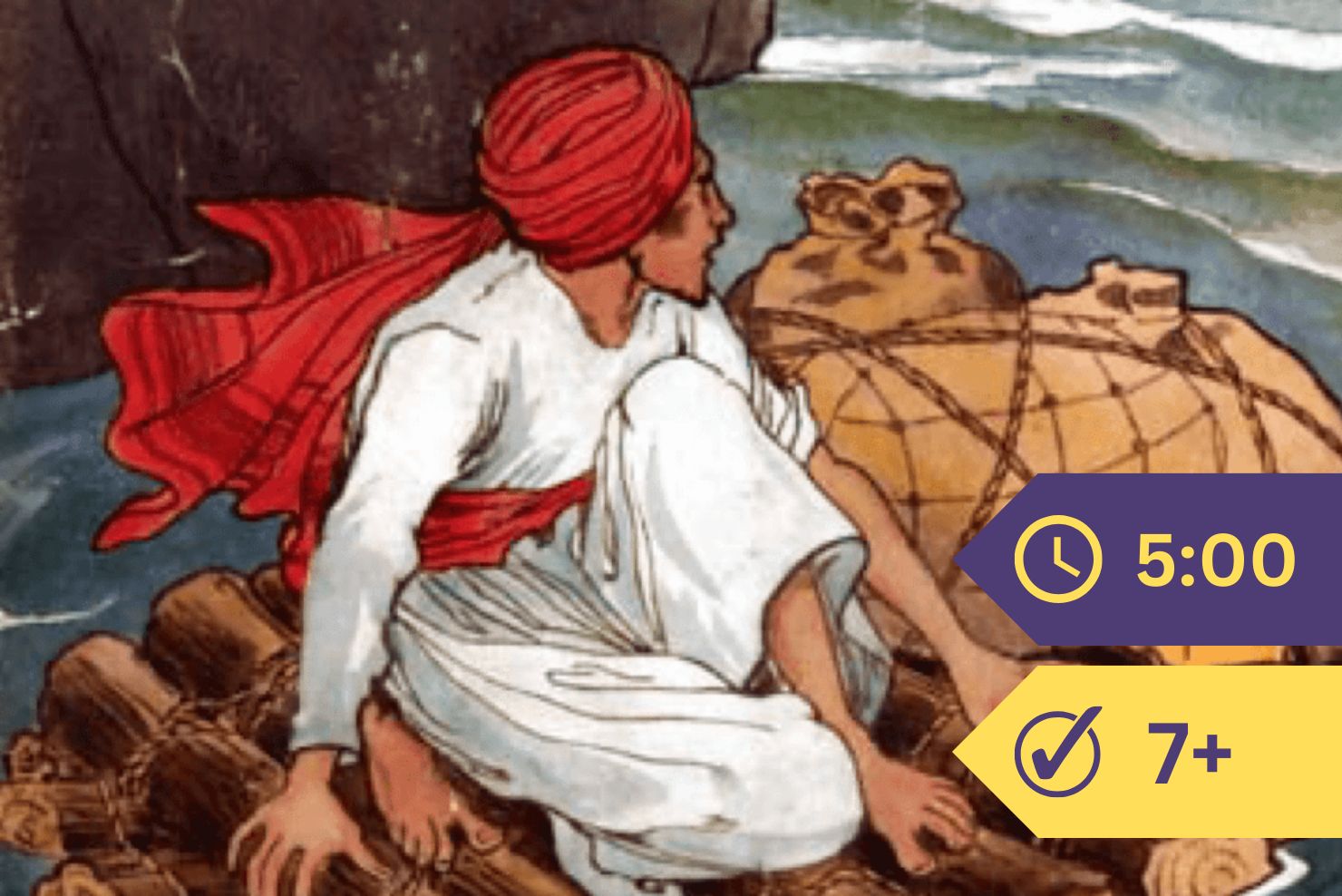Here was, in olden time, and in an ancient age and period, in the land of the Persians, a king named Shahzeman, and the place of his residence was Khorassan. He had not been blest, during his whole life, with a male child nor a female; and he reflected upon this, one day, and lamented that the greater portion of his life had passed, and he had no heir to take the kingdom after him as he had inherited it from his fathers and forefathers. So the utmost grief befell him on this account.
Now while he was sitting one day, one of his mamelukes came in to him, and said to him: “O my lord, at the door is a slave-girl with a merchant: none more beautiful than she hath been seen.” And he replied: “Bring to me the merchant and the slave-girl.” The merchant and the slave-girl therefore came to him; and when he saw her, he found her to resemble the lance in straightness and slenderness. She was wrapped in a garment of silk embroidered with gold, and the merchant uncovered her face, whereupon the place was illuminated by her beauty, and there hung down from her forehead seven locks of hair reaching to her anklets. The King, therefore, wondered at the sight of her, and at her beauty, and her stature and justness of form; and he said to the merchant: ‘‘O sheikh, for how much is this damsel to be sold?” The merchant answered: “O my lord, I purchased her for two thousand pieces of gold of the merchant who owned her before me, and I have been for three years travelling with her, and she hath cost, to the period of her arrival at this place, three thousand pieces of gold; and she is a present from me unto thee.’’ Upon this, the king conferred upon him a magnificent robe of honour, and gave orders to present him with ten thousand pieces of gold. So he took them, and kissed the hands of the king, thanking him for his beneficence, and departed. Then the king committed the damsel to the tirewomen, saying to them: “Amend the state of this damsel, and deck her, and furnish for her a private chamber, and take her into it.” He also gave orders to his chamberlains that everything which she required should be conveyed to her. The seat of government where he resided was on the shore of the sea, and his city was called the White City. And they conducted the damsel into a private chamber, which chamber had windows overlooking the sea; and the king commanded his chamberlains to close all the doors upon her after taking to her all that she required.
The king then went in to visit the damsel; but she rose not to him, nor took any notice of him. So the king said: ‘‘It seemeth that she hath been with people who have not taught her good manners.” And looking at the damsel, he saw her to be a person surpassing in loveliness, her face was like the disk of the moon at the full, or the shining sun in the clear sky; and he wondered at her beauty, extolling the perfection of God, the Creator: then the king advanced to the damsel, and seated himself by her side, pressed her to his bosom, and kissed her lips, which he found to be sweeter than honey. After this, he gave orders to bring tables of the richest viands, comprising dishes of every kind; and he ate, and put morsels into her mouth until she was satisfied; but she spoke not a single word. The king talked to her, and inquired of her her name; but she was silent, not uttering a word, nor returning him an answer, ceasing not to hang down her head toward the ground; and what protected her from the anger of the king was her beauty, and her tenderness of manner. So the king said within himself: “Extolled be the perfection of God, the Creator of this damsel! How elegant is she, saving that she doth not speak!”—Then the king asked the female slaves whether she had spoken; and they answered him: “From the time of her arrival to the present moment she hath not spoken one word, and we have not heard her talk.” The king therefore caused some of them to come, and sing to her, and make merry with her, thinking that then she might perhaps speak. Accordingly the female slaves played before her with all kinds of musical instruments, and enacted sports and other performances, and they sang so that every one who was present was moved with delight, except the damsel, who looked at them and was silent, neither laughing nor speaking. So the heart of the king was contracted. He however inclined to her entirely, paying no regard to others, but relinquishing all the rest of his favourites.
He remained with her a whole year, which seemed as one day, and still she spoke not; and he said to her one day, when his passion was excessive: “O desire of souls, verily the love that I have for thee is great, and I have relinquished for thy sake all my worldly portion, and been patient with thee a whole year. I beg God that He will, in His grace, soften thy heart toward me, and that thou mayest speak to me. Or, if thou be dumb, inform me by a sign, that I may give up hope of thy speaking. I also beg of God that He will bless thee with a son that may inherit my kingdom after me; for I am solitary, having none to be my heir, and my age hath become great. I conjure thee, then, by Allah, if thou love me, that thou return me a reply.” And upon this, the damsel hung her head toward the ground, meditating. Then she raised her head, and smiled in the face of the king, whereat it appeared to the king that lightning filled the private chamber; and she said: “O magnanimous King, God hath answered thy prayer; for I am about to bring thee a child, and the time is almost come. And were it not that I knew this thing, I had not spoken to thee one word.” And when the king heard what she said, his face brightened up with happiness, and he kissed her hands by reason of the violence of his joy, and said: “Praise be to God who hath favoured me with things that I desired; the first, thy speaking; and the second, thy information that thou art about to bring me a child.” Then the king arose and went forth from her, and seated himself upon the throne of his kingdom in a state of exceeding happiness; and he ordered the vizier to give out to the poor and the needy a hundred thousand pieces of gold as a thank-offering to God. So the vizier did as the king had commanded him. And after that, the king went in to the damsel, and embraced her, saying to her: “O my mistress, wherefore hath been this silence, seeing that thou hast been with me a whole year, awake and asleep, yet hast not spoken to me, except on this day?”
The damsel answered: “Hear, O King of the age, and know that I am a poor person, a stranger, broken-hearted: I have become separated from my mother, and my family, and my brother.” And when the king heard her words, he knew her desire, and he replied: “As to thy saying that thou art poor, there is no occasion for such an assertion; for all my kingdom and possessions are at thy service, and as to thy saying, ‘I have become separated from my mother and my family and my brother’—inform me in what place they are, and I will send to them, and bring them to thee.” So she said to him: “Know, O King, that my name is Gulnare (Pomegranate Flower) of the Sea. My father was one of the Kings of the Sea, and he died, and left to us the kingdom; but while we were enjoying it, another of the kings came upon us, and took the kingdom from our hands. I have also a brother named Saleh, and my mother is of the women of the sea; and I quarrelled with my brother, and swore that I would throw myself into the hands of a man of the inhabitants of the land. Accordingly I came forth from the sea, and sat upon the shore of an island in the moonlight, and there passed by a man who took me and sold me to this man from whom thou tookest me, and he was an excellent, virtuous man, a person of religion and fidelity and kindness. But had not thy heart loved me, and hadst thou not preferred me above all thy wives, I had not remained with thee one hour; for I should have cast myself into the sea from this window, and gone to my mother and my people. I was ashamed, however, to go to them; for they would imagine evil of me, and would not believe me, even though I should swear to them, were I to tell them that a king had purchased me with his money, and chosen me in preference to his other wives and all that his right hand possessed. This is my story, and peace be on thee!” And when he heard her words, he thanked her, and kissed her between the eyes, and said to her: “By Allah, O my mistress, and light of my eyes, I cannot endure separation from thee for one hour; and if thou quit me, I shall die instantly. How then shall the affair be?” She answered: “O my master, the time of the birth is near, and my family must come.” “And how,” said the king, “do they walk in the sea without being wetted?’’ She answered: “We walk in the sea as ye walk upon the land, through the influence of the names engraved upon the seal of Solomon, the son of David, upon both of whom be peace! But, O King, when my family and my brethren come, I will inform them that thou boughtest me with thy money, and hast treated me with beneficence, and it will be meet that thou confirm my assertion to them. They will also see thy state with their eyes, and will know that thou art a king, the son of a king.” And thereupon the king said: “O my mistress, do what seemeth fit to thee, and what thou wishest; for I will comply with thy desire in all that thou wilt do.” And the damsel said: “Know, O King of the age, that we walk in the sea with our eyes open, and see what is in it, and we see the sun, and the moon, and the stars, and the sky as on the face of the earth, and this hurteth us not. Know also, that in the sea are many peoples and various forms of all the kinds that are on the land; and know, moreover, that all that is on the land, in comparison with what is in the sea, is a very small matter.’’ And the king wondered at her words.
Then the damsel took a bit of aloes-wood and, having lighted a fire in a perfuming-vessel, threw into it that bit, and she proceeded to speak words which no one understood; whereupon a great smoke arose, while the king looked on. After this, she said to the king: “O my lord, arise and conceal thyself in a closet, that I may shew thee my brother and my mother and my family without their seeing thee; for I desire to bring them, and thou shalt see in this place, at this time, a wonder, and shalt marvel at the various shapes and strange forms that God hath created.” So the king arose immediately, and entered a closet, and looked to see what she would do. And she proceeded to burn perfume and repeat spells until the sea foamed and was agitated, and there came forth from it a young man of comely form, of beautiful countenance, like the moon at the full, with shining forehead, and red cheeks, and hair resembling pearls and
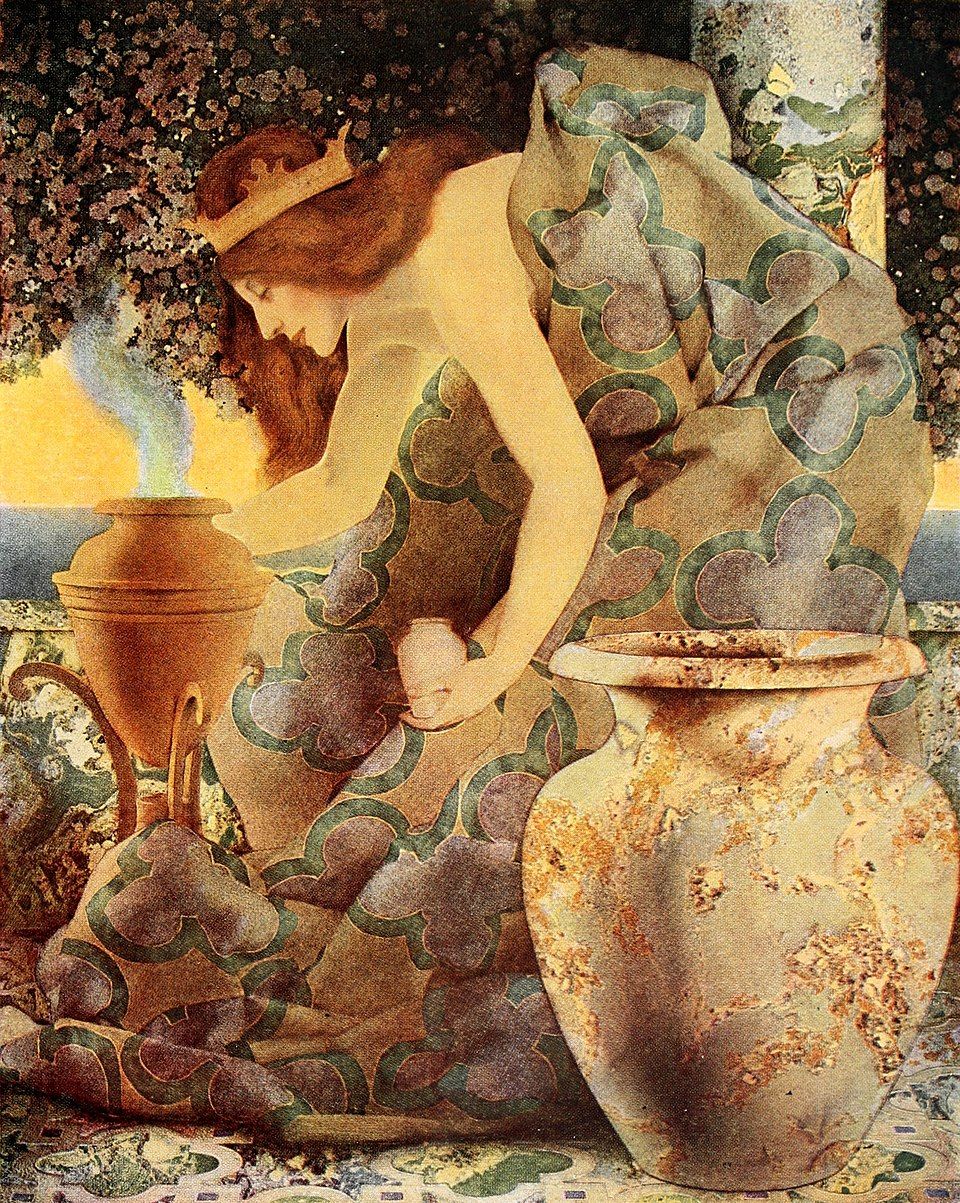
jewels; he was, of all the creation, the most like to his sister, and the tongue of the case itself seemed to recite in his praise these verses:—
The moon becometh perfect once in each month; but the loveliness of thy face is perfect every day.
Its abode is in the heart of one sign at a time; but thine abode is in all hearts at once.
Afterward, there came forth from the sea a grizzly-haired old woman, and with her five damsels, resembling moons and bearing a likeness to the damsel whose name was Gulnare. Then the king saw the young man and the old woman and the damsels walk upon the surface of the water until they came to Gulnare; and when they drew near to the window, and she beheld them, she rose to them and met them with joy. On their seeing her, they knew her, and they went in to her and embraced her, weeping violently; and they said to her: “O Gulnare, how is it that thou leavest us for four years, and we know not the place in which thou art? By Allah, we had no delight in food nor in drink a single day, weeping night and day on account of the excess of our longing to see thee.” Then the damsel began to kiss the hand of her brother, and the hand of her mother, and so also the hands of the daughters of her uncle, and they sat with her awhile, asking her respecting her state, and the things that had happened to her, and her present condition.
So she said to them: “Know ye, that when I quitted you, and came forth from the sea, I sat upon the shore of an island, and a man took me, and sold me to a merchant, and the merchant brought me to this city, and sold me to its king for ten thousand pieces of gold. Then he treated me with attention, and forsook all his favourites for my sake, and was diverted by his regard for me from everything that he possessed and what was in his city.” And when her brother heard her words, he said: “Praise be to God who hath reunited us! But it is my desire, O my sister, that thou wouldst arise and go with us to our country and our family.” So when the king heard the words of her brother, his reason fled in consequence of his fear lest the damsel should accept the proposal of her kindred, and he could not prevent her, though he was inflamed with love of her; wherefore he became perplexed in violent fear of her separation. But as to the damsel Gulnare, on hearing the words of her brother she said: “By Allah, O my brother, the man who purchased me is the king of this city, and he is a great king, and a man of wisdom, generous, of the utmost liberality. He hath treated me with honour, and he is a person of kindness, and of great wealth, but hath no male child nor a female. He hath shewn me favour too, and acted well to me in every respect; and from the day when I came to him to the present time, I have not heard from him a word to grieve my heart; but he hath not ceased to treat me with courtesy, and I am living with him in the most perfect of enjoyments. Moreover, if I quitted him, he would perish: for he can never endure my separation even for a single hour. I also, if I quitted him, should die of my love for him in consequence of his kindness to me during the period of my residence with him; for if my father were living, my condition with him would not be like my condition with this great, glorious king. God (whose name be exalted!) afflicted me not, but compensated me well; and as the king hath not a male child nor a female, I beg God to bless me with a son that may inherit of this great king these palaces and possessions.” And when her brother, and the daughters of her uncle, heard her words, their eyes became cheerful thereat, and they said to her: “O Gulnare, thou art acquainted with our affection for thee, and thou art assured that thou art the dearest of all persons to us, and art certain that we desire for thee comfort, without trouble or toil. Therefore if thou be not in a state of comfort, arise and accompany us to our country and our family; but if thou be comfortable here, in honour and happiness, this is our desire and wish.” And Gulnare replied: “By Allah, I am in a state of the utmost enjoyment, in honour and desirable happiness.” So when the king heard these words from her, he rejoiced, and he thanked her for them; his love for her penetrated to his heart’s core, and he knew that she loved him as he loved her, and that she desired to remain with him to see his child which she was to bring to him.
Then the damsel Gulnare of the Sea gave orders to the female slaves to bring forward viands of all kinds; and Gulnare herself was the person who superintended the preparation of the viands in the kitchen. So the female slaves brought to them the viands, and the sweetmeats, and the fruits; and she ate with her family. But afterward they said to her: “O Gulnare, thy master is a man who is a stranger to us, and we have entered his abode without his permission, and thou praisest to us his excellence, and hast also brought to us his food, and we have eaten, but have not seen him, nor hath he seen us, nor come into our presence, nor eaten with us, that the bond of bread and salt might be established between us.” And they all desisted from eating, and were enraged at her, and fire began to issue from their mouths as from cressets. So when the king beheld this, his reason fled, in consequence of the violence of his fear of them. Then Gulnare rose to them, and soothed their hearts; after which she walked along until she entered the closet in which was the king her master; and she said to him: “O my master, didst thou see, and didst thou hear my thanks to thee, and my praise of thee in the presence of my family; and didst thou hear what they said to me, that they desired to take me with them to our family and our country?” The king answered her: “I heard and saw. May God recompense thee! By Allah, I knew not the extent of the love that thou feelest for me until this blessed hour.” She replied: “O my master, is the recompense of beneficence aught but beneficence? How then could my heart be happy to quit thee, and to depart from thee? Now I desire of thy goodness that thou come and salute my family, that they may see thee, and that pleasure and mutual friendship may ensue. For know, O King, that my brother and my mother and the daughters of my uncle have conceived a great love for thee in consequence of my praising thee to them, and they have said, ‘We will not depart from thee to our country until we have an interview with the king, and salute him.’” And the king said to her: “I hear and obey; for this is what I desire.” He then rose from his place, and went to them, and saluted them with the best salutation; and they hastened to rise to him; they met him in the most polite manner, and he sat with them in the pavilion, ate with them at the table, and remained with them for a period of thirty days. Then they desired to return to their country and abode. So they took leave of the king and Queen Gulnare of the Sea, and departed from them, after the king had treated them with the utmost honour.
After this, Gulnare gave birth to a boy, resembling the moon at the full, whereat the king experienced the utmost happiness, because he had not before been blessed with a son nor a daughter during his life. They continued the rejoicings, and the decoration of the city, for a period of seven days, in the utmost happiness and enjoyment; and on the seventh day, the mother of Gulnare, and her brother, and the daughters of her uncle, all came, when they knew that she had given birth to her child. The king met them, rejoicing at their arrival, and said to them: “I said that I would not name my son until ye should come, and that ye should name him according to your knowledge.” And they named him Bedr Basim (Smiling Full Moon), all of them agreeing as to this name. They then presented the boy to his maternal uncle, Saleh, who took him upon his hands, and, rising with him from among them, walked about the palace to the right and left; after which he went forth with him from the palace, descended with him to the sea, and walked on until he became concealed from the eye of the king. So when the king saw that he had taken his son, and disappeared from him at the bottom of the sea, he despaired of him, and began to weep and wail. But Gulnare, seeing him in this state, said to him, “O King of the age, fear not nor grieve for thy son; for I love my child more than thou, and my child is with my brother; therefore fear not his being drowned. If my brother knew that any injury would betide the little one, he had not done what he hath done; and presently he will bring thee thy son safe, if it be the will of God, whose name be exalted!” And but a short time had elapsed when the sea was agitated, and the uncle of the little one came forth from it, having with him the king’s son safe, and he flew from the sea until he came to them, with the little one in his arms, silent, and his face resembling the moon in the night of its fulness. Then the uncle of the little one looked toward the king, and said to him: ‘‘Perhaps thou fearedst some injury to thy son when I descended into the sea, having him with me.” So he replied: “Yes, O my master, I feared for him, and I did not imagine that he would ever come forth from it safe.” And Saleh said to him: ‘‘O King of the Land, we applied to his eyes a lotion that we know, and repeated over him the names engraved upon the seal of Solomon, the son of David; for when a child is born among us, we do to him as I have told thee. Fear not therefore, on his account, drowning, nor suffocation, nor all the seas if he descend into them. Like as ye walk upon the land, we walk in the sea.”
He then took forth from his pocket a case, written upon, and sealed; and he broke its seal, and scattered its contents, whereupon there fell from it strung jewels, consisting of all kinds of jacinths and other gems, together with three hundred oblong emeralds, and three hundred oblong large jewels, of the size of the eggs of the ostrich, the light of which was more resplendent than the light of the sun and the moon. And he said: “O King of the age, these jewels and jacinths are a present from me unto thee; for we never brought thee a present, because we knew not the place of Gulnare’s abode. So when we saw thee to have become united to her, and that we all had become one, we brought thee this present; and after every period of a few days, we will bring thee the like of it. For these jewels and jacinths with us are more plentiful than the gravel upon the land, and we know the excellent among them, and the bad, and the places where they are found, and they are easy of access to us.”—And when the king looked at those jewels, his reason was confounded and his mind was bewildered, and he said: “By Allah, one of these jewels is worth my kingdom!” Then the king thanked Saleh of the Sea for his generosity, and looking toward the Queen Gulnare said to her: “I am abashed at thy brother; for he hath shewn favour to me, and presented me with this magnificent present, which the people of the earth would fail to procure.” So Gulnare thanked her brother for that which he had done; but her brother said: “O King of the age, to thank thee hath been incumbent on us; for thou hast treated my sister with beneficence, and we have entered thine abode, and eaten of thy provision.” Then Saleh said: “If we stood serving thee, O King of the age, a thousand years, regarding nothing else, we could not requite thee, and our doing so would be but a small thing in comparison with thy desert.” And Saleh remained with the king, he and his mother and the daughters of his uncle, forty days; after which he arose and kissed the ground before the king, the husband of his sister. So the king said to him: “What dost thou desire, O Saleh?” And he answered: “O King of the age, we desire of thy goodness that thou wouldst give us permission to depart; for we have become desirous of seeing again our family and our country and our relations and our homes. We will not, however, relinquish the service of thee, nor that of my sister nor the son of my sister; and by Allah, O King of the age, to quit you is not pleasant to my heart; but how can we act, when we have been reared in the sea, and the land is not agreeable to us?” So when the king heard his words, he rose upon his feet, and bade farewell to Saleh of the Sea and his mother and the daughters of his uncle, and they wept together on account of the separation. Then they said to the king: “We will never relinquish you, but after every period of a few days we will visit you.” And after this, they flew toward the sea, and descended into it, and disappeared.
The king treated Gulnare with beneficence, and honoured her exceedingly, and the little one grew up well; and his maternal uncle, with his grandmother and the daughters of his uncle, after every period of a few days used to come to the residence of the king, and to remain with him a month, and then return to their places. The boy ceased not to increase in beauty and loveliness until his age became fifteen years; and he was incomparable in his perfect beauty, and his stature and his justness of form. He had learned writing and reading, and history and grammar and philology, and archery; and he learned to play with the spear; and he also learned horsemanship, and all that the sons of the kings required. There was not one of the children of the inhabitants of the city, men and women, that talked not of the charms of that young man; for he was of surpassing loveliness and perfection; and the king loved him greatly. Then the king summoned the vizier and the emeers, and the lords of the empire, and the great men of the kingdom, and made them swear by binding oaths that they would make Bedr Basim king over them after his father; so they swore to him by binding oaths, and rejoiced thereat; and the king himself was beneficent to the people, courteous in speech and of auspicious aspect. And on the following day, the king mounted, together with the lords of the empire and all the emeers, and all the soldiers, and they ceased not to proceed until they arrived at the vestibule of the palace; the king’s son riding. Thereupon he alighted, and his father embraced him, he and the emeers, and they seated him upon the throne of the kingdom, while his father stood, as also did the emeers, before him. Then Bedr Basim judged the people, displaced the tyrannical and invested the just, and continued to give judgment until near midday, when he rose from the throne of the kingdom, and went in to his mother, Gulnare of the Sea, having upon his head the crown, and resembling the moon. So when his mother saw him, and the king before him, she rose to him and kissed him, and congratulated him on his elevation to the dignity of sultan; and she offered up a prayer in favour of him and his father for length of life, and victory over their enemies. He then sat with his mother and rested; and when the time of afternoon-prayers arrived, he rode with the emeers before him until he came to the horse-course, where he played with arms till the time of nightfall, together with his father and the lords of his empire; after which he returned to the palace, with all the people before him. Every day he used to ride to the horse-course; and when he returned, he sat to judge the people, and administered justice between the emeer and the poor man. He ceased not to do thus for a whole year; and after that, he used to ride to the chase, and go about through the cities and provinces that were under his rule making proclamation of safety and security, and doing as do the kings; and he was incomparable among the people of his age in glory and courage, and in justice to the people.
Now it came to pass that the old king, the father of Bedr Basim, fell sick one day, whereupon his heart throbbed, and he felt that he was about to be removed to the mansion of eternity. Then his malady increased so that he was at the point of death. He therefore summoned his son, and charged him to take care of his subjects and his mother and all the lords of his empire and all the dependants. He also made them swear, and covenanted with them a second time, that they would obey his son; and he confided in their oaths. And after this he remained a few days, and was admitted to the mercy of God, whose name be exalted! His son Bedr Basim, and his wife Gulnare and the emeers and viziers and the lords of the empire, mourned over him; and they made for him a tomb, and buried him in it, and continued the ceremonies of mourning for him a whole month. Saleh, the brother of Gulnare, and her mother, and the daughters of her uncle, also came, and consoled them for the loss of the king; and they said: “O Gulnare, if the king hath died, he hath left this ingenuous youth, and he who hath left such as he is hath not died. This is he who hath not an equal, the crushing lion, and the splendid moon.” Then the lords of the empire, and the grandees, went in to the King Bedr Basim, and said to him: “O King, there is no harm in mourning for the king; but mourning becometh not any save women; therefore trouble not thy heart and ours by mourning for thy father; for he hath died and left thee, and he who hath left such as thou art hath not died.” They proceeded to address him with soft words, and to console him, and after that they conducted him into the bath; and when he came forth from the bath, he put on a magnificent suit woven of gold, adorned with jewels and jacinths, and he put the royal crown upon his head, seated himself upon the throne of his kingdom, and performed the affairs of the people, deciding equitably between the strong and the weak, and exacting for the poor man his due from the emeer; wherefore the people loved him exceedingly. Thus he continued to do for the space of a whole year; and after every short period, his family of the sea visited him; so his life was pleasant, and his eye was cheerful: and he ceased not to live in this state until he was visited by the terminator of delights and the separator of companions. This is the end of their story. The mercy of God be on them all!

